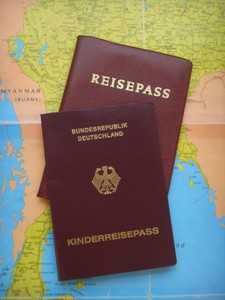
Behavioral rules Thailand – for a harmonious start to Thailand adventure
The culture shock on a trip to Thailand is limited according to their own openness, which is partly due to the fact that a Thai people do not impose their culture – and rarely point it out in the case of inappropriate behavior. This then leads to many visitors that they actually “wrong” or at least “questionable” behave and are not even aware of it.
This is primarily because Thais are not usually looking for open confrontation, but if this rare case happens, great caution is needed. For example, if people run through Pai without a T-shirt, they are more likely to be admonished by resident farangs (generic term Western foreigner), but not Thais. Often comes even a saying in the direction “The Thais have nothing against it” – you can only say: But, they have already, but they do not tell you directly.
We would like to introduce some rules of conduct and special features in Thailand, with which one is confronted or even as a first time visitor.
The Wai and the greeting – the address of people
This is what a properly executed Wai looks like – we did not actually find a photo in our archive, unbelievable!
The Thai greeting consists of the greeting “Sawadee” (pronounced “sawatdii”) and the appendix “kha” (women) or “krab” (men). These tags should in principle be attached to EVERY sentence, it is a courtesy phrase, and a “sawawe” without a “krab” is only half as valuable and sounds wrong.
Add to that the “Wai”, a greeting with folded hands. The height of the hand position depends on the status of the opponent, for monks, for example, the hands are held in front of the forehead, normally in front of the chest, fingers at chin height. It is often recommended that a wai is not expected from a foreigner, which is basically correct, but the bottom line is that it is always received with pleasure. The “Wai” is also used when apologized and thanked.
When children make a beautiful wai, the hearts of the Thais melt away, and by the way most of the children enjoy it – not least because of the exuberant reactions of the Thai people. Liam sometimes fell forward at the age of 14, so enthusiastically he made the greeting.
The salutation and use of names
Thais actually use only first names, more precisely, nicknames. Namely, most people have replaced the official name with a nickname, whether it’s the parents or someone they choose later in life. It’s that simple, you do not like one of the names, you choose another – we like the concept. Accordingly, one should always call the name of the name and not speculate to be addressed as “Mr. Maier” in the question of the name.
In addition, there are three words or prefixes that you can say before the actual name:
We are Victoria, Chris and Liam and want to tell you about our life in Thailand, Germany and the rest of the world.

- “Khun Chris”: As a courtesy, you can prefix a “khun”, whether it’s a woman or a man.
- “Pi Chris”: If the conversation partner is older, “Pi” is even better, this also applies to special respecters such as monks or village leaders. If one does not know the name of a person, “Pi” is also a respectful solution to addressing them and in everyday life is content with a “Pi” very often.
- “Nong Chris”: Is used in people who are younger, especially in children. We find, as a tourist, it is better not to use “Nong” in adults. Thais put it z. B. without name often at waiters, etc., a certain devaluation is not entirely unintentional.
Respect is important and omnipresent
As you may have noticed, showing respect in everyday life is very important in Thailand. A particularly good example is the passing of older, sedentary people.
The etiquette then provides that the person passing by stoops so far that the head is below that of the sitter. It is enough even the symbolic stooping, for example, if you pass by people sitting on the floor. But with your nose strutting into the sky strutting, that’s not so welcome.
Yelling is generally not appropriate. Whether to call a person or in a discussion, a reasonable volume without complaining and moaning brings you in doubt always faster to the target as an emotional outburst. It should be noted that the often loud way of speaking, which Europeans cultivate, borders on screaming in the ears of Thais – then one can imagine how real screaming works.
There are individual groups of people, to whom special respect is brought:
- The king and members of the royal family: The king is untouchable for Thais and insults of every kind can lead to drastic punishments, even to jail. As insult applies here both negative speech as well as smudging the attached in many places photos or even stepping on a bill – these contain namely an image of the king. When the anthem sounds (in the morning and in the evening on the radio and, for example, before every feature film), all people rise out of respect, you should just join.
- Buddhist monks: Monks are highly respected persons in Thailand and women are not allowed to touch a monk, men should refrain from it. Monks do not have to reciprocate the Wai.
- High reputation and position: A village head, military or police officer also enjoys higher respect.
- Older persons: In general, persons older than oneself are addressed with “Pi” as a prefix and treated with due respect.
In addition, it is essential not to profane any statues of the Buddha. So no fuss and silly selfies with a statue finds no one funny, there have been in recent years frightening examples of human derailment.
And again the hint, just because no one says anything in such a situation, does not mean that she will be approved.
An extreme example was about 2 years ago two Russians who broke into a temple near us, drunk and otherwise drugged. They then sat in monks’ robes in the prayer hall and continued to drink until the monks of the monastery discovered them there. Arrest and immediate deportation – they would have been well served. One of them, however, preferred to use a knife to attack a police officer when transferred to another prison. The deportation was then lapsed first.
Lose the face
This book was filled with books about the generally widespread fear of “losing face”, especially in Asia. The essence is that you do not want to be exposed in public and that others want to spare. This has some interesting effects, but also offers advantages in terms of avoiding hassles. A few example situations that are affected by it:
- The question of the way is often answered vaguely, even if one is not sure. One simply does not want to admit the ignorance. This can happen to a taxi driver.
- The waitress, who does not understand the order correctly, acts according to what she thinks she heard, instead of asking again after the second time.
- Gifts are usually not opened by Thais in front of the giver, because one could offend by a false reaction this.
- To publicly criticize someone for a mistake, and even if it is so clear to criticize, is an absolute no-go. This applies to the waitress who brings the wrong food as well as to the doctor who makes a questionable diagnosis. Combined with screaming and complaining it quickly becomes a serious problem.
- Even among friends, it is not possible or appropriate to direct the elderly to obvious mistakes. Especially in business or family problem situations this can be a curse. For us usually hard to prove, but is just a different culture and way of thinking and should be respected.
Meaning of head, hands and feet
The head is sacred to Thais and there sits the self. Touching strangers on the head is not a good idea, even with strangers it is not necessarily advisable. Whereby the latter Thais like to do straight with farangs, that is a double-edged sword. Knowing the children, it is not a problem to express affection in this way.
As far as the use of hands is concerned, wild gesturing is considered rude. You should never point to other people with your fingers.
And the feet, that’s a special topic. Feet are the opposite of the head and are considered dirty and unclean. Accordingly, they are ritually washed before a massage, if they are to be touched afterwards. Therefore, one leaves his shoes in front of the house or many local stand (note appropriate signs) and therefore you should try never to show the soles of the feet on other people. Entangled legs are therefore often inappropriate. Put your feet on the table an even worse offense than with a strict German patriarch.
In Pai, there is an old, very traditional barber who sends people of any origin home when they are waiting with their legs crossed to get their turn. With the hint, that you should come back tomorrow, with the right manners.
Clothes make people
Thais attach great importance to a well-groomed appearance. No one looks at a farmer at an angle when he comes out with dirty clothes – but if you’re a wealthy person (and you’re automatically, if you can afford the long journey) in torn clothing, you should expect no great enthusiasm. Hard times for (old) hippies! A friend of ours made a lot of money in Pai by selling “Hippies Smell” T-shirts, their customers were at least 50% Thais. Matching is the habit of not wearing shoes. Put simply, if you normally want your shoes to stand before entering a home, how do you do that when you’re not wearing shoes??
Related Posts
-

Tips on accident prevention and safety in the household
safety Many safety tips in the household. Safety in the household is very important . Especially if you work daily in the household. Therefore, you…
-

Tour Thailand with children – tips from our own experience
Touring Thailand with children – Tips Thailand is an ideal family travel destination: safe, affordable, relatively well developed, offering a good mix of…
-

The best time to visit thailand – climate table and tips for your family holiday
Best time to travel to Thailand Thailand has a tropical climate, it is very warm all year round, with high humidity. During the day , the temperature is…
-

News – abu dhabi travel tips, your honest – detailed travel guide
Abu Dhabi Travel Tips | Your honest detailed travel guide Tips from vacationers to vacationers looking for Abu Dhabi? On my travel blog you are…
